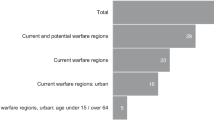Abstract
The financial crisis, which began in summer 2007 in the USA and then spread contagiously throughout the rest of the world, is systemic in nature. Indeed, it is not a local or regional crisis. It is the inevitable starting point of a process which for more than 30 years has changed at its very roots the financial way of being and doing, thus undermining the very bases of that liberal social order which is at the core of Western civilization. The nature of the causes of the crisis is twofold: those immediate, which speak of the specific characteristics adopted in recent times by the financial markets, and those remote, which blame aspects of the cultural matrix which accompanied the transition from industrial to financial capitalism. From the moment that epoch-making phenomenon which we call globalization began to take shape, finance not only constantly increased its quota of activity in the economic sphere, but it has also progressively contributed to transform both people’s cognitive maps and their value systems. It is to this latter that one refers today in speaking of the financialization of society. The article mainly deals with the remote causes of the crisis with the aim of showing the consequences of the misleading ideology diffused by mainstream economics, from which have drunk market agents, government political authorities and controlling agencies.
Similar content being viewed by others
References
Akerlof G, Shiller R (2009) Animal spirits. How human psychology drives the economy and why it matters for global capitalism. Princeton University Press, Princeton
Blanchard O (2008) The tasks ahead. IMF WP 262/08
Buiter W (2009) The unfortunate uselessness of most ‘state of the art’ academic monetary economics. Financial Times, March 3, 2009
Cooper G (2008) The origin of financial crises. Vintage Books, New York
Dahl R (1985) A preface to economic democracy. University of California Press, Berkeley
Diamond D, Rajan R (2009) The credit crisis. NBER, WP 1473, February
Frydman R, Goldberg M (2007) Imperfect knowledge economics. Princeton University Press, Princeton
Keynes JM (1926) The end of laissez faire. Hogarth Press, London
Linciano D (2008) La crisi dei mutui subprime. Consob, Milan
Mason P (2009) Meltdown. The end of the age of greed. Verso, London
Mc Donnell J (1978) Are moral requirements hypothetical imperatives? Proc Arist Soc 52:13–29
Morris CR (2008) Crack. Come siamo arrivati al collasso del mercato e cosa ci riserva il futuro. Elliot, Rome
Prasad E (ed) (2009) The G-20 London Summit 2009. Recommendations for global policy coordination. Brookings Institution, Washington, DC
Reich R (2008) Supercapitalismo. Come cambia l’economia globale e i rischi per la democrazia. Fazi, Milan
Shafer G, Vovk V (2001) Probability and finance. Wiley, New York
Shiller RJ (2008) Shock finance. New York
von Wright GH (1987) Immagini della scienza e forme di razionalità. Editori Riuniti, Rome
World Bank (2008) Lessons from World Bank research on financial crises. World Bank, Washington, DC
Zamagni S (2006) The ethical anchoring of corporate social responsibility. In: Zsolnai L (ed) Yearbook of business ethics. Peter Lang, Oxford, UK
Zamagni S (2009) Avarizia. Il Mulino, Bologna
Author information
Authors and Affiliations
Corresponding author
Rights and permissions
About this article
Cite this article
Zamagni, S. The lesson and warning of a crisis foretold: a political economy approach. Int Rev Econ 56, 315–334 (2009). https://doi.org/10.1007/s12232-009-0080-y
Published:
Issue Date:
DOI: https://doi.org/10.1007/s12232-009-0080-y




